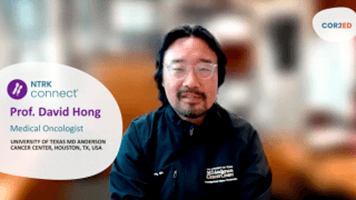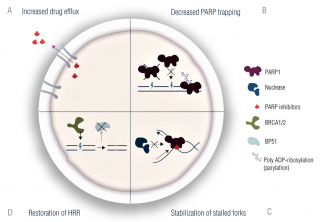
The role and place of genetic testing in prostate cancer
The role and place of genetic testing in prostate cancer
Our GU CONNECT experts provide their thoughts and opinions on the challenging topic of the role and place of genetic testing in prostate cancer. Our GU CONNECT experts provide their thoughts and opinions on the challenging topic of the role and place of genetic testing in prostate cancer.Dr. Elena Castro, Dr. Neal D. Shore, Dr. Daniel Keizman, Prof. Gerhardt Attard
Watch the video and download the slides
Dr. Elena Castro
Medical Oncologist
Hospital Universitario Virgen de la Victoria
Spain

Dr. Neal D. Shore
Urologist
Carolina Urologic Research Centre and GenesisCare
United States (US)

Dr. Daniel Keizman
Medical Oncologist
Tel-Aviv Sourasky Medical Center
Israel

Prof. Gerhardt Attard
Medical Oncologist
University College London Cancer Institute
United Kingdom (UK)



Dr. Elena Castro
Medical Oncologist
Hospital Universitario Virgen de la Victoria
Spain
Dr. Elena Castro has received financial support/sponsorship for research support, consultation, or speaker fees from the following companies:

Dr. Neal D. Shore
Urologist
Carolina Urologic Research Centre and GenesisCare
United States (US)
Dr. Neal D. Shore has received financial support/sponsorship for research support, consultation, or speaker fees from the following companies:

Dr. Daniel Keizman
Medical Oncologist
Tel-Aviv Sourasky Medical Center
Israel
Dr. Daniel Keizman has received financial support/sponsorship for research support, consultation, or speaker fees from the following companies:

Prof. Gerhardt Attard
Medical Oncologist
University College London Cancer Institute
United Kingdom (UK)
Prof. Gerhardt Attard has received financial support/sponsorship for research support, consultation, or speaker fees from the following companies:
|
5 min
|
Mar 2021
This programme was made for you: your opinion matters
Share your feedback in just 4 clicks and help us to continue to create the content you need.
I agree that this educational programme:
Was valuable to me:
1/4
Has improved my knowledge of this topic:
2/4
Is likely to change my clinical practice:
3/4
Was balanced and unbiased:
4/4
download resources
This programme was made for you: your opinion matters
Share your feedback in just 4 clicks and help us to continue to create the content you need.
I agree that this educational programme:
Was valuable to me:
1/4
Has improved my knowledge of this topic:
2/4
Is likely to change my clinical practice:
3/4
Was balanced and unbiased:
4/4
Hello, I’m Daniel Keizman, on behalf of GU CONNECT.
We’re going to talk today about the challenging topic, for which there are various opinions which is the role and place of genetic testing in prostate cancer.
Let’s hear the opinion of our experts.
Professor Gert Attard, Medical Oncologist, University College London, UK
When should we perform genetic testing for a metastatic prostate cancer patient? So the rule, when the test is going to inform on a treatment change that the patient has access to, key now is testing for BRCA status in metastatic CRPC progressing on abiraterone or enzalutamide to access PARP inhibitors, but I guess that, as with every good rule, there are exceptions.
In JCO Precision Oncology we published a paper showing that the success rate for a tumour biopsy younger than 8-months old was 92% for targeted NGS but an archival historic sample has a success rate of less than 70%.
So the sooner we perhaps see a patient, the higher the success rate and will genetic information inform on follow-up interval, access to clinical trials, the search for access to expensive drugs? So my view keep genetic testing in mind all the time but ensure you have that information when the patient requires a treatment change.
Dr Neal Shore, Urologist, Carolina Urologic Research Center, USA
So I love this question when should you begin genetic testing. I start germline testing in all of my patients who have high-risk localised disease, metastatic disease, whether de novo or recurrent, and any patient who has a significant family history.
Additionally I do somatic testing in all of my patients with metastatic disease. Some recommendations say wait till their mCRPC but I like getting somatic testing, preferably tissue-based but I’ll also do liquid, for patients that I find additional indications of genetic alterations for approved indications for example now with PARP inhibitors or even checkpoint inhibitors for MSI high as well as TMB high but there’s, in the US, 14 different gene alterations that we can interrogate. The most prominent one being BRCA2.
So that’s my plea for all my colleagues to think about doing genetic testing, to do the right genomic profiling. We have approved indications, we have clinical trials. More gene alterations will come to the surface of our understanding especially with some of the variants of uncertain significance right now. So please test, please think about it. We have indications, clinical trials. Thank you very much.
Dr Elena Castro, Medical Oncologist, Malaga Biomedical Research Institute, Spain
When should we consider genetic testing for patients with advanced prostate cancer? Well now that we have PARP inhibitors available for patients with metastatic castration-resistant prostate cancer, whose disease has progressed to an androgen receptor signalling inhibitor, we should perform tumour testing in all patients who are eligible for a second-line of therapy if we have not performed these tests before, in order to identify the presence of an alteration in BRCA1 or BRCA2 that may predict response to these therapies.
Besides we should also offer germline testing to all patients with metastatic prostate cancer because about 10% of them will carry an inherited mutation in a cancer pre-disposition gene. BRCA2 is the most frequently altered gene and carriers can also benefit from PARP inhibitors. But equally important, this finding will trigger cascade testing and the relatives at-risk could benefit from early detection programs.
Dr Roberto Iacovelli, Medical Oncologist, Fondazione Policlinico Gemelli IRCCS, Rome, Italy
About the question of this newsletter. I generally perform genetic tests for BRCA1 or BRCA2 mutations during second-line of therapy for castration-resistant disease in order to have this result available for the choice of third line of therapy. I test my patient for somatic mutation and eventually for germline mutation.
And another important point in my clinical practice is that the majority of patients have no good quality tumour tissue for this analysis or enough tumour tissue for this analysis. Then when it is possible I try to perform a new tumour biopsy.
Finally my message for you is test your patient during second-line and if it’s possible perform a new tumour biopsy.
Dr Daniel Keizman, Medical Oncologist, Tel Aviv Sourasky Medical Center, Israel
Thank you to the experts regarding their opinion. My personal opinion is that I consider genetic testing of the tumour in various stages.
In early prostate cancer in patients that I consider active surveillance I would try and see if I can do a genetic test to better risk stratify the patient and then when you have a patient after radical prostatectomy where genetic tests might try to help us see whether the patient should get adjuvant radiation therapy if he has negative predictive factors. Then if we have a patient with a biochemical failure, rising PSA after surgery we have genetic testing to try and see what’s the risk and the potential benefit of salvage therapy like radiation therapy.
And finally in patients with metastatic castration-resistant prostate cancer, we do genetic tests to see if, for example, we have a mutation in the BRCA or other DNA repair gene so that we can give the patient targeted therapies like PARP inhibitors.
Thank you very much to our experts and to you for listening today. I’m Daniel Keizman, from GU CONNECT.
The role and place of genetic testing in prostate cancer
Our GU CONNECT experts, Dr Daniel Keizman (Israel), Prof Gert Attard (UK), Dr Neal Shore (USA), Dr Elena Castro (Spain) and Dr Roberto Iacovelli (Italy) provide their thoughts and opinions on the challenging topic of the role and place of genetic testing in prostate cancer.
Watch the video and download the slides.
GU CONNECT is an initiative of COR2ED, supported by an Independent Educational Grant from AstraZeneca, Bayer and Eisai Europe Limited.




































